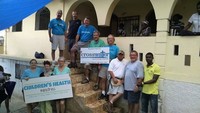
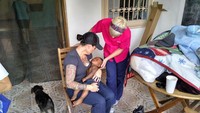
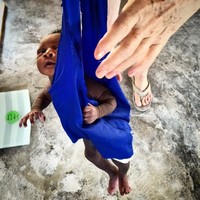
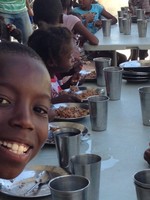
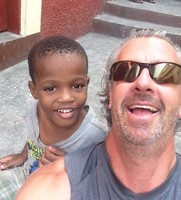
The rundown former school in Port-au-Prince, Haiti didn’t look like much.
Abandoned since the 2010 earthquake that devastated the country, the 5,000 square-foot building was dirty, dilapidated and lacked running water and stable electricity.
Over the course of four days in early April, however, seven local residents associated with Crosswater Community Church made enough repairs and improvements to the facility for it to become the home a new health clinic run by the nonprofit Children’s Health Ministries. Led by Crosswater’s Senior Pastor Jack Millwood and Adult Pastor George Powers, the Crosswater team included two doctors and several congregation members, who employed their construction and electrical skills to create a permanent home for CHM’s efforts to aid infants, children and expectant mothers in one of the world’s poorest nations.
In addition to cleaning, painting and making general repairs to the facilities, the Crosswater team installed a 1.8kw solar panel system and water tank on the roof.
“By the time we left, the whole clinic had plenty of electricity and running water with flushing toilets,” Crosswater volunteer Blake Deal said. “My main role was to be the ‘contractor,’ and we had Mike Lore, a local electrician, wiring everything up.”
Through the financial support of Crosswater Community Church – which has made several previous mission trips to Haiti and allocates a portion of its monthly missions budget to pay the lease on the building – CHM will now be able to provide basic health, medical and nutrition services to the island nation’s women and children.
“We’re just glad God has given us this opportunity to minister to the people of Haiti,” Pastor George Powers said.
Saving lives
A chance encounter with an employee at The Columbia Restaurant in St. Augustine led to Crosswater’s connection to Haiti.
“After surviving the great recession and rebuilding my life, I felt very grateful and just wanted to give back in some way,” Crosswater member Blake Deal said. “One of the bartenders (at the Columbia) heard me talking about wanting to do some good down in Haiti while I was having drinks with a friend.”
The bartender noted that her daughter and a friend, Holly Harmon, had worked as child trauma counselors in the country and that Harmon had moved there permanently to aid the local people. She put Deal in touch with Harmon and in November 2014, Deal, Powers and two others made their first trip to Haiti to explore ways in which the Crosswater congregation could be of service.
It was on that trip that the Crosswater crew met retired Minnesota nurse Mickey McRoberts, who had moved to Haiti and was using her retirement savings to operate Children’s Health Ministries with her daughter, Liz Peterson.
“Mickey was rapidly depleting her savings,” Deal said. “She told us that if we could help she could extend services up into the rural areas by running ‘mobile clinics’ when we came.”
The group returned to Ponte Vedra, raised money and returned to Haiti in spring and fall 2016 to operate mobile health clinics. Working alongside McRoberts and local volunteers, the Crosswater contingent of doctors, nurses and congregation members with a heart for service ministered to local pregnant women and infants, providing general medical care and minor surgical procedures for as many as 600 children in a week.
“People would walk for hours just to get to the clinic,” Powers noted. “We know of at least a dozen cases where infants would have died were it not for the care we provided.”
When the medical team identifies children who are malnourished, they are put on the clinic’s nutrition program that includes “Medika Mamba,” a Haitian food product designed specifically to treat acute malnutrition.
Medications, infant formula and other supplies are all purchased through donations. In addition, the Crosswater Community Church congregation has supported the mission trips by preparing special “birthing kits” for the mission teams to bring to Haiti.
“Most births in Haiti don’t occur in hospitals – most don’t even have a midwife present,” Powers said. “One of the biggest things we do is provide birthing kits that give women the basic tools to use in delivering their baby safely at home.”
In addition to antiseptic wipes and other basic medical supplies, the kit comes with birthing instructions, infant diapers, a onesie and a sterile pad on which to lay the newborn baby.
“To date, we’ve distributed over 300 birthing kits to expectant mothers in Haiti,” Powers said.
A growing ministry
Crosswater members who have participated in the Haiti mission trips say the experience of aiding others amid such poverty and devastation is both moving and rewarding.
“I was really overcome with emotion, seeing the fear on the children’s faces as we weighed them and tried to help them,” said Pastor Powers, noting that most of the children don’t speak English. “You look in their eyes and it’s like they’re crying out, ‘Help me.’ But a smile and a gesture can speak volumes. Hearts communicate to hearts.”
Dr. Scott Covington – one of Crosswater’s medical volunteers – has even become chair of the Children’s Health Ministries board of directors. “Haiti is the poorest country in the Western hemisphere – one of out every six children dies of malnutrition and the average adult income is less than $2 a day,” he said. “As to our involvement, James was very clear: ‘Suppose there are brothers or sisters who need clothes and don’t have enough to eat. What good is there in your saying to them God bless you! Keep warm and eat well!’”
Powers said that Crosswater plans to continue making regular mission trips to Haiti, and is considering offering a summer trip so that youth could participate. Participants are responsible for paying for their own expenses, which Deal estimated at $1,500 for lodging, transportation and funds to assist with the clinic’s operations.
Deal also noted that he believes many people may be under the impression that Haiti is receiving significant volunteer support already and therefore more assistance isn’t needed.
“I don’t know where all these other people are, but when we are down there we rarely see other people helping,” he said. “So if (people) aren’t going to Haiti because they think the place is full of people helping, I can tell you for sure that it’s not! There is plenty of room for additional help.”
Individuals interested in making a donation or learning more about Crosswater’s Haiti mission trips may visit http://crosswaterchurch.net/childrens-health-ministries. One hundred percent of all donations go directly to aiding the children of Haiti.